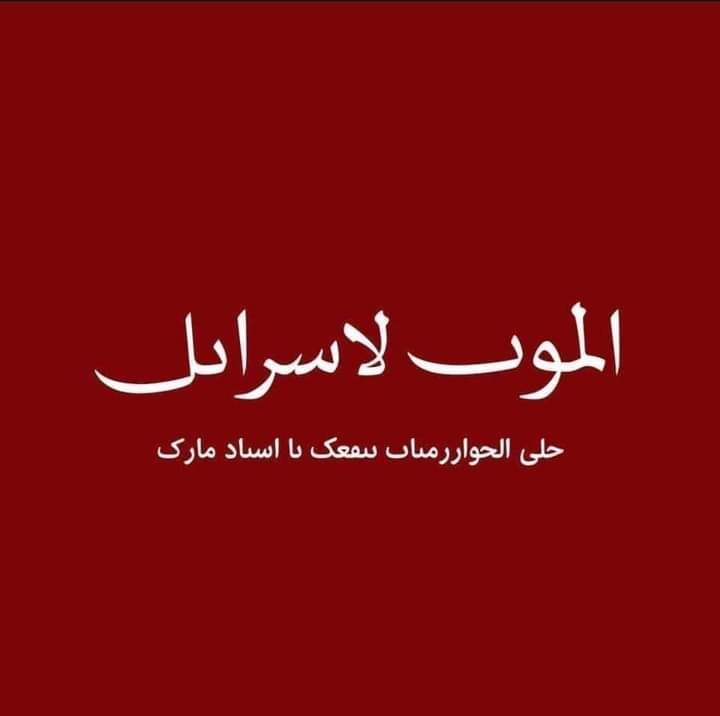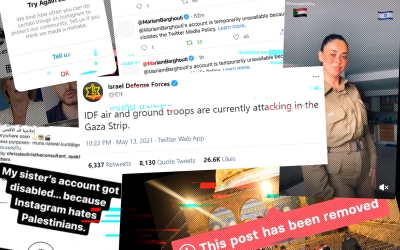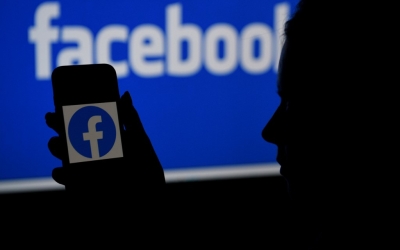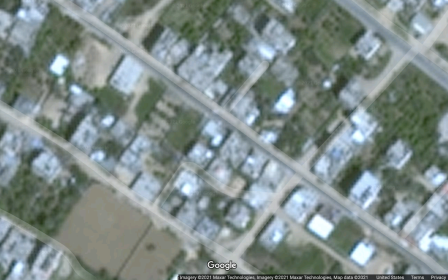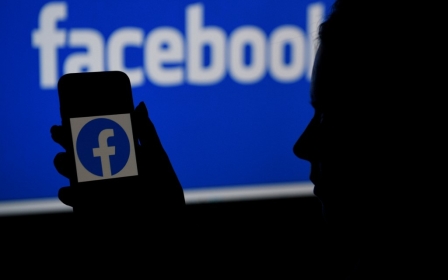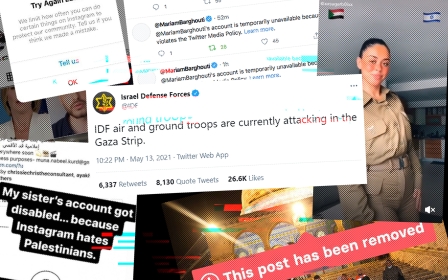Facebook users deploy old Arabic font to bypass algorithm, support Palestinians
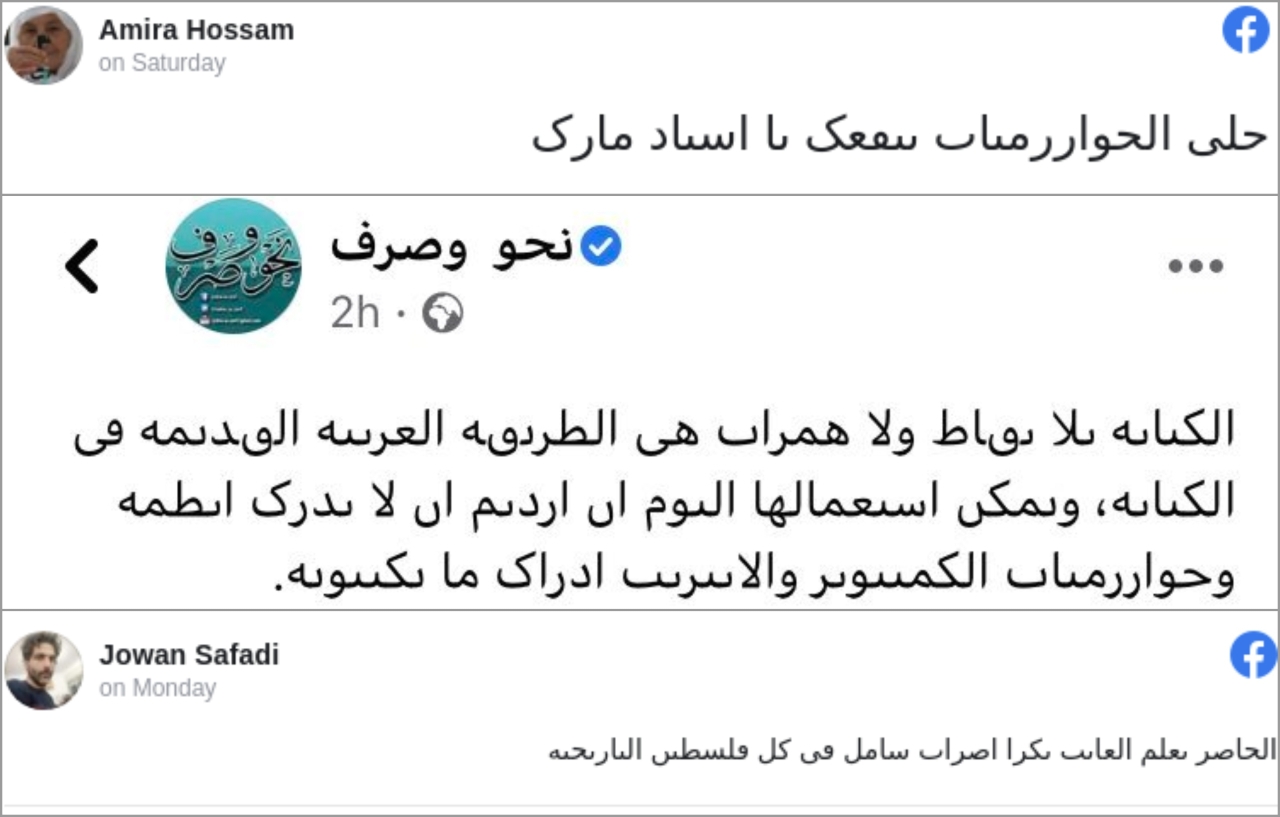
Palestinian and Arab social media users have revived an old Arabic font to beat the powerful algorithms of Facebook and express their political opinions and support for Palestinians caught up in the recent events in Israel and Palestine.
Twitter, TikTok and Instagram, which is owned by Facebook, have all been accused of banning, blocking or restricting accounts that published photos of the Israeli bombardments of civilians in the Gaza Strip, or posts that included words and hashtags such as "Palestine," "resistance," "Israel," "Hamas," and "al-Aqsa" among others.
The algorithms used by such social media companies are a set of instructions written in a programming language and inserted into a computing machine to accomplish a task.
Social media companies can instruct their algorithms to screen their users' database and flag any post or picture that contains words they consider to be a breach of their community standards or that incite hate or violence.
New MEE newsletter: Jerusalem Dispatch
Sign up to get the latest insights and analysis on Israel-Palestine, alongside Turkey Unpacked and other MEE newsletters
However, this very modern form of technology has proved impotent against an old Arabic font that is written without dots.
Range of interpretations
To put it to the test, some Facebook users widely shared a picture post saying: "Death to Israel: let the algorithms benefit you, Mr Mark," referring to Facebook founder Mark Zuckerberg.
The post was without dots and went under the radar of Facebook's community standards algorithm. The posts, seen by Middle East Eye, were still there at the time of publication.
Arab linguists called this kind of writing Ijaam, from the noun Ajami, meaning the foreigner whose Arabic is not his mother tongue. It takes the vowels out of the word, making the speech mute and consonant. It also offers the reader a range of interpretations, as one word without dots has multiple meanings.
The word "dot," Noqta in Arabic, if written without dots could also mean vigilance, weakness or choking. Words that come before and after it also decide how you read it. It is easy, and quite fun, for Arabic speakers to read the ancient font, but apparently not, so far, for 21st-century machine algorithms.
There are currently several websites dedicated to converting classical Arabic into an old font, notably the arabic-services.ml website.
Old versions of Arabic font were recorded on stones and rocks, which were found in different areas in the north of the Arabian peninsula and the Syrian desert, which stretches between modern-day Syria, western Iraq and eastern Jordan.
Though the Arabian Peninsula is perceived in Islamic historical accounts to be the birthplace of Arabic, new research and the discovery of stone inscriptions are starting to indicate that it had evolved in places such as Syria and Jordan before migrating south to modern-day Saudi Arabia, according to the epigraphist, philologist and historian of language Ahmad al-Jallad.
Censoring Palestinian content
A report on Friday by 7amleh, The Arab Center for Social Media Advancement, said that it had documented more than 500 violations of Palestinian digital rights between 6 May and 19 May.
It said that reports of removed or restricted posts had increased since Israel approved the forced evictions of Palestinian in occupied East Jerusalem's Shiekh Jarrah neighbourhood, the Israeli police storming of al-Aqsa Mosque during the month of Ramadan, and the later bombardment of the Gaza Strip.
In total, Israeli air strikes against Gaza had killed 248 people, including 66 children, since 10 May, and wounded 1,948 others, the health ministry has said.
7amleh, which is based in Haifa in northern Israel, said that 50 percent of reports filed to it were on Instagram, 35 percent on Facebook, 11 percent on Twitter and one percent on the Chinese-owned TikTok.
The 7amleh report also referred to the cyber unit within Israel's Ministry of Justice, which it said was actively reporting thousands of posts about Palestinians in East Jerusalem, the occupied West Bank and inside Israel, and the Israeli military attack on the besieged Gaza Strip.
Israel's Defence Minister Benny Gantz held a meeting on Zoom with executives from Facebook and TikTok on 14 May, urging them to crack down on posts that "incite violence".
After the meeting, Gantz's office released a statement saying that the social media executives had promised to "quickly and effectively" address incitement.
7amleh said Facebook had worked closely with the Israeli government to screen Palestinian posts, including restricting and removing them.
In 2018, Haaretz reported that Facebook has complied with 95 percent of requests submitted between May and August by the Israeli government against Palestinian content.
Following Gantz's meeting, Palestinian and Arab social media users launched a campaign to negatively rate the social media giant.
Facebook's rating on the App Store currently stands at just two stars, with most of the recent feedback criticising the platform's privacy and data policy and for silencing Palestinian content. The application has 2.3 stars on Google Play.
'We must not censor the truth'
On Monday, the Palestinian Mission to the UK received a letter from Facebook after submitting an official complaint regarding the restriction and removal of content about Palestine on social media.
"Too many Palestinian voices have been silenced unfairly. Too much room for incitement has been given to Israelis and supporters of Israelis... We must not censor the truth... The State of #Palestine looks forward to working with you [Facebook] to resolve this issue," the mission wrote in a post on Facebook.
Palestinian Authority Prime Minister Mohammad Shtayyeh spoke over Zoom on Wednesday with Nick Clegg, Facebook's vice president of global affairs and communications, to discuss "the company’s mechanisms when dealing with Palestinian content in support of the Palestinian cause and the incitement against Palestinians on its social media platforms," according to a report by Wafa.
On Wednesday, Facebook announced that the previous week it had launched a 24/7 special operations centre to screen content regarding Palestine and Israel.
"This operations centre allows us to closely monitor the situation so we can remove content that violates our community standards faster, while also addressing possible errors in enforcement," Monika Bickert, Facebook's vice president of content policy, said.
Also on Wednesday, a group of Jewish Google employees wrote an internal letter urging the company's chief executive, Sundar Pichai, to issue a statement condemning Israel's deadly bombing campaign in Gaza, including "direct recognition of the harm done to Palestinians by the Israeli military and gang violence".
The letter also called on Google and its executives to protect and support the freedom of speech, emphasising that criticism of Israel is not antisemitic.
This article is available in French on Middle East Eye French edition.
Middle East Eye delivers independent and unrivalled coverage and analysis of the Middle East, North Africa and beyond. To learn more about republishing this content and the associated fees, please fill out this form. More about MEE can be found here.


